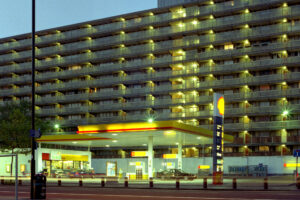Amy Lamé, London’s Night Czar, has always been in a difficult position. Despite being paid a six-figure salary for a part-time role, the purpose of which is to resuscitate London’s shitty nightlife, she has virtually no political power and very ill-defined responsibilities. And as you’ll know if you’ve tried to go out in London after-hours recently, her tenure has not been a success. Added to this, close examination of her name reveals that, were it not for the last-minute intervention of a diacritical mark, she would be called Amy “Lame”: a perilous situation for a London Night Czar to be in when she has done nothing to make London itself anything but lame.
Lamé was hired in 2016 as part of Sadiq Khan’s “plan to turn London into a leading 24-hour global city”, her job being to “champion nightlife and nurture our night time economy”. Since then, some of her more ill-disposed critics have pointed out that she doesn’t seem to have done much to “nurture” London’s night-time economy — apart, that is, from presiding over an impressive salary hike for Night Czars employed by London’s Mayoral Office.
The real challenge when you’re placed in a cushy political role, with negligible power and no prospect of remedying the social ill for which your job has been designed, is sensing when to declare victory. Lamé, it turns out, can’t do this properly either. In a widely ridiculed recent op-ed defending her record, she madly proclaimed London “the best 24-hour city in the world”, one whose “world-renowned nightlife” had left “other global cities looking to [it] for inspiration”. Sitting rather uneasily alongside this vapid triumphalism was repeated acknowledgement of the “huge challenges” London’s night-time economy nonetheless faces.
Apparently banking on the fact that no one watching had ever visited another major city, Lamé doubled down on this baffling line in a follow-up interview with the BBC. London, she insisted, was a “truly 24-hour city”. When the awkward question arose of what exactly London’s 24-hour economy consisted of, Lamé’s puzzling first suggestion was people “working for the NHS” — the implication being that, because it is still possible late at night to travel across the capital by ambulance, London is a thriving metropolis. It is difficult to know what makes this defiant style of political gaslighting seem a good idea, even when you bear in mind that Lamé had to account for herself somehow. The claim that London is “the best” 24-hour city in the world isn’t just false — it involves obvious presupposition failure. London is simply not up and running half the time.
Consider, as I often do, drinking. Has London ever been a more hostile environment for late-evening drinkers than it is now? Wander into a London pub at any point after dark, and more likely than not your offer to trade money for alcohol will be met with the familiar vitriolic shake of the barman’s head that conveys the response: “Are you mad? It’s almost 9:30 on a Thursday evening, of course we’re closed.” Over the years, I have gone to simply extraordinary lengths to prolong an evening of drinking in London. I have dashed about town on the shakiest of speculations that some-place-this-guy-knows might still be open. I have climbed into strange taxis with taxing strangers. I have posed as a guest in hotel bars. Seeing no alternative, I have allowed myself to be bullied into nightclubs so unpleasant that no amount of alcohol short of a lethal dosage could alleviate the misery of being there.
On one particularly dispiriting evening, my friends and I once completed the paperwork necessary to join a members-only casino just so that they’d let us carry on drinking their past midnight, a short while after which we were asked to leave for not gambling enough. Dragged against my will in the early hours to a club staffed by topless dancers who seemed to be under instruction to target aloof customers, I found myself explaining, as camply as seemed necessary, that, unlikely as it might sound, I was actually just there for the conversation and the £14 bottles of Heineken. “Everybody gets a dance,” came the ominous reply, as reinforcement hostesses advanced towards me like gunboats out of the half-darkness. I begged; I pleaded incoherently to just be allowed to sit and drink; and somewhere out in the night I could hear the sound of Amy Lamé cashing another enormous cheque.
What kind of society imposes such frightening costs on law-abiding citizens? Dr Johnson conjectured that a man tired of London must be tired of life. But he didn’t know about Sadiq Khan’s “24-hour London Vision”. Today, it is only those who against all the odds haven’t quite given up on living whom London is still able to routinely terrorise and disappoint. Time a midweek visit correctly — either quite early or quite late — and swathes of central London take on a practically post-apocalyptic atmosphere: the streets deserted, the lifeless city resembling a monumental abandoned film-set which you can stamp around like Philip Seymour Hoffman in the closing scenes of Synecdoche New York, wondering whether anyone else has noticed how unhinged things have become.
To make the situation more maddening, the underlying causes of London’s nightlife problem aren’t hard to grasp. The scarcely credible fact that London does not have a network-wide 24-hour underground system discourages businesses from operating, and people from socialising, late in the evening. You can read the deadweight loss off the empty streets. The few places that make a point of staying open late have a captive, self-selected, audience and can be as nasty and expensive as they like.
Civilised nightlife dies under these constraints. In the last three years, 1,100 bars and clubs have closed in London. Added to this, the kind of bars, clubs and pubs that you’d want to stay open are terrorised by local authorities, which allow a small number of hostile actors to behave like veto players over late-night activity: withholding licences, bullying businesses with excess regulation, and ministering to Nimbyist instincts about noise and activity even in the densest and most central parts of London.
It is important not to forget what a manifestly unnatural constraint this is to impose on city life. If there aren’t going to be late-opening bars and restaurants in, say, Soho, then these things aren’t going to be anywhere. And if this is the case, it is not at all obvious what the distinctive function of a city is supposed to be. On that framing, it is no longer true that part of the implicit bargain of city-dwelling is that one sacrifices private space and income in the expectation that one is compensated by a hospitable and vibrant public realm.
All of this raises the question of why anyone would put up with the dysfunctional, life-denying norms that have degraded London’s nightlife. It is tempting to think that the only psychologically sustainable response towards such constraints is complacent acceptance. Perhaps we have become accustomed to thinking of it as a brute inevitability that, mid-conversation and at some point around 10pm, the bells sound out across London, the dentist-chair lighting snaps on, and everyone is instructed to leave — initiating the hard-transition to somewhere grosser, more expensive and further away. It doesn’t help, of course, that the horrors and privations of London’s nightlife are felt mainly by the young, a group which in recent years has revealed itself to have only the feeblest grip on its collective interest as a political class.
One predictable reaction to this dismal picture of youth culture is the sort of self-congratulatory bullet-biting that comes so naturally to the proponents of contemporary public-health moralism. Drinking, carousing, casual sex: these things are bad for you, unhealthy, inherently risky. Better, in the image of Amy Lamé’s London, to have a night-time economy staffed principally by health workers keeping alive a population with increasingly little to live for. On the moralist’s view, what might feel like personal deprivation, and the frustration of natural instincts, is in fact all in the service of the theoretic collective good.
During lockdown, many young people self-consciously welcomed the disappearance of Fomo — complacently satisfied by the knowledge that everyone was having as bad a time as they were. Even at the time, it was clear that this reaction expressed a mistakenly parochial view of what counts as missing out. Whole groups and cities, as well as individuals, can miss out if they try hard enough.
Disclaimer
Some of the posts we share are controversial and we do not necessarily agree with them in the whole extend. Sometimes we agree with the content or part of it but we do not agree with the narration or language. Nevertheless we find them somehow interesting, valuable and/or informative or we share them, because we strongly believe in freedom of speech, free press and journalism. We strongly encourage you to have a critical approach to all the content, do your own research and analysis to build your own opinion.
We would be glad to have your feedback.
Source: UnHerd Read the original article here: https://unherd.com/




